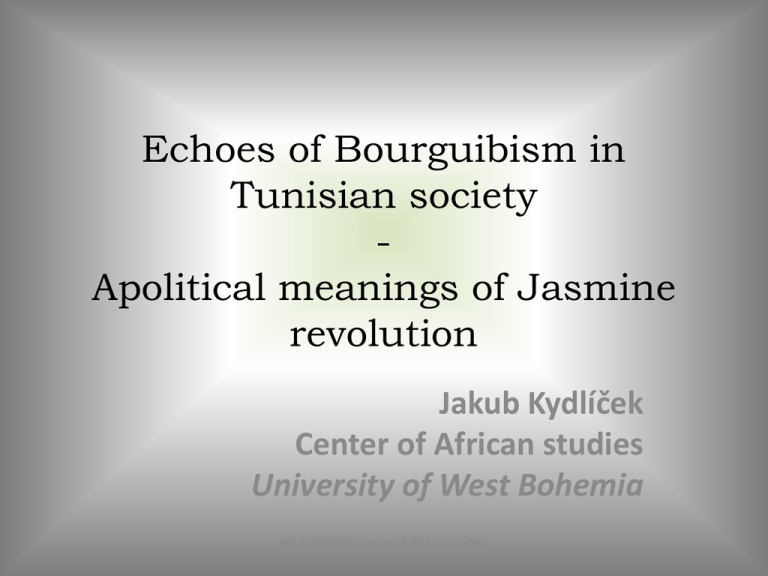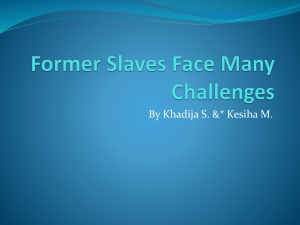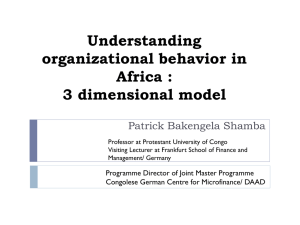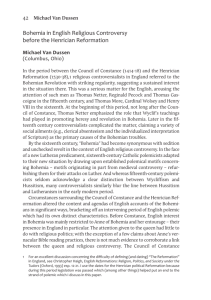Echoes of bourguibism in tunisian society
advertisement

Echoes of Bourguibism in Tunisian society Apolitical meanings of Jasmine revolution Jakub Kydlíček Center of African studies University of West Bohemia Jakub Kydlíček, Centre of African studies, University of West Bohemia Research questions • Why Tunisia? - „tunisian“ exception due to „citizenship“? • Picture of Bourguiba as a frame of identity? - „belle époque“ as utopia of the past? Jakub Kydlíček, Centre of African studies, University of West Bohemia Methodology • Discourse analysis within targeted groups • Participant observation and semi-structured questioning • Random sample – taxi/louage drivers, hotel staff • Analysis of press, media and internet expressions Jakub Kydlíček, Centre of African studies, University of West Bohemia Birth of „tunisian society“ • French impact – acquisiton of western political terms into tunisian nationalist mind • Reflections of „bourguibism“ - commentary as frame for definition of ideology (Ch. Micaud) • Creation of middle class trough bourguibist pragamtic reforms Jakub Kydlíček, Centre of African studies, University of West Bohemia • a. Dignity (individual and collective) with the "promotion of human," which calls for national self-determination. This dignity, however, could be not satisfied with the acquisition of independence, but has to continue through the development of democracy. • b. The belief in human solidarity - as factor justifying the nationalist aspect as well as economic aspect of development, designed to move towards a democracy. It is the pursuit for national cohesion that excludes tribalism and leftist traditionalism. • c. Confidence in the power of reason, which is the result of the pro-Western discourse of scientific and critical thinking. Reason is the adoption of realism and pragmatism. This approach is convenanting with Bourguiba promoted "politique des étapes". Patient pragmatism is the opposite of revolutionary dogmatism or sentimentality, which are just a form of irrationality. (Micaud, 1964) Jakub Kydlíček, Centre of African studies, University of West Bohemia Bourguiba as rethorical strategy (based on random sample of ca. 30 taxi drivers) • Arab persuasive techniques : - Presentation as a proof (B. J. Koch, 1983) - creating social interaction vs. information transfer - Repetitive figures ّ - يخطط ( يح ّدد وdefines and delimits), التخريب و التدمير (destruction and demolition) - „Argumentum ad fontem“ - commemoration of historical fact for justifying of present act Jakub Kydlíček, Centre of African studies, University of West Bohemia Keywords (and posssible categories) • „leader“ / „zacīm“ • (“zaïm”) • Cult of personality : „père de la nation“, „père de l'indépendence“ • Posts : „président“, „Chef de l’État“, „Chef de Gouvernement“, „Homme d‘État“ Acts : „libérateur de la Tunisie“, „fondateur de la Tunisie moderne“, „combattant suprême“/„al-Mudjahid al-Akbar“ „Bānī Tūnis al-Jadīd“ Jakub Kydlíček, Centre of African studies, University of West Bohemia Young generation Infijar sukani and young generation with no job opportunities – colapsed concept of „Universities as symbol of succes“ Bourguibism as aculturated competence - acculturation based on… shared symbols (Bourguiba in every place) language (QED) and determined by … lack of alternative worldview (defeat of islamism, RCD dominance) Bourguibism as the only hope Jakub Kydlíček, Centre of African studies, University of West Bohemia Jakub Kydlíček, Centre of African studies, University of West Bohemia Jakub Kydlíček, Centre of African studies, University of West Bohemia www.bourguiba.com Jakub Kydlíček, Centre of African studies, University of West Bohemia Case study : Bouazizi Jakub Kydlíček, Centre of African studies, University of West Bohemia First protests – similarities with Bread riots in 80s „martyrisation“ of Bouazizi Uprising for middle class Possible scenario : collapse of „tunisian identity“? neo-bourguibism Jakub Kydlíček, Centre of African studies, University of West Bohemia Thank you for your attention Jakub Kydlíček, Centre of African studies, University of West Bohemia









